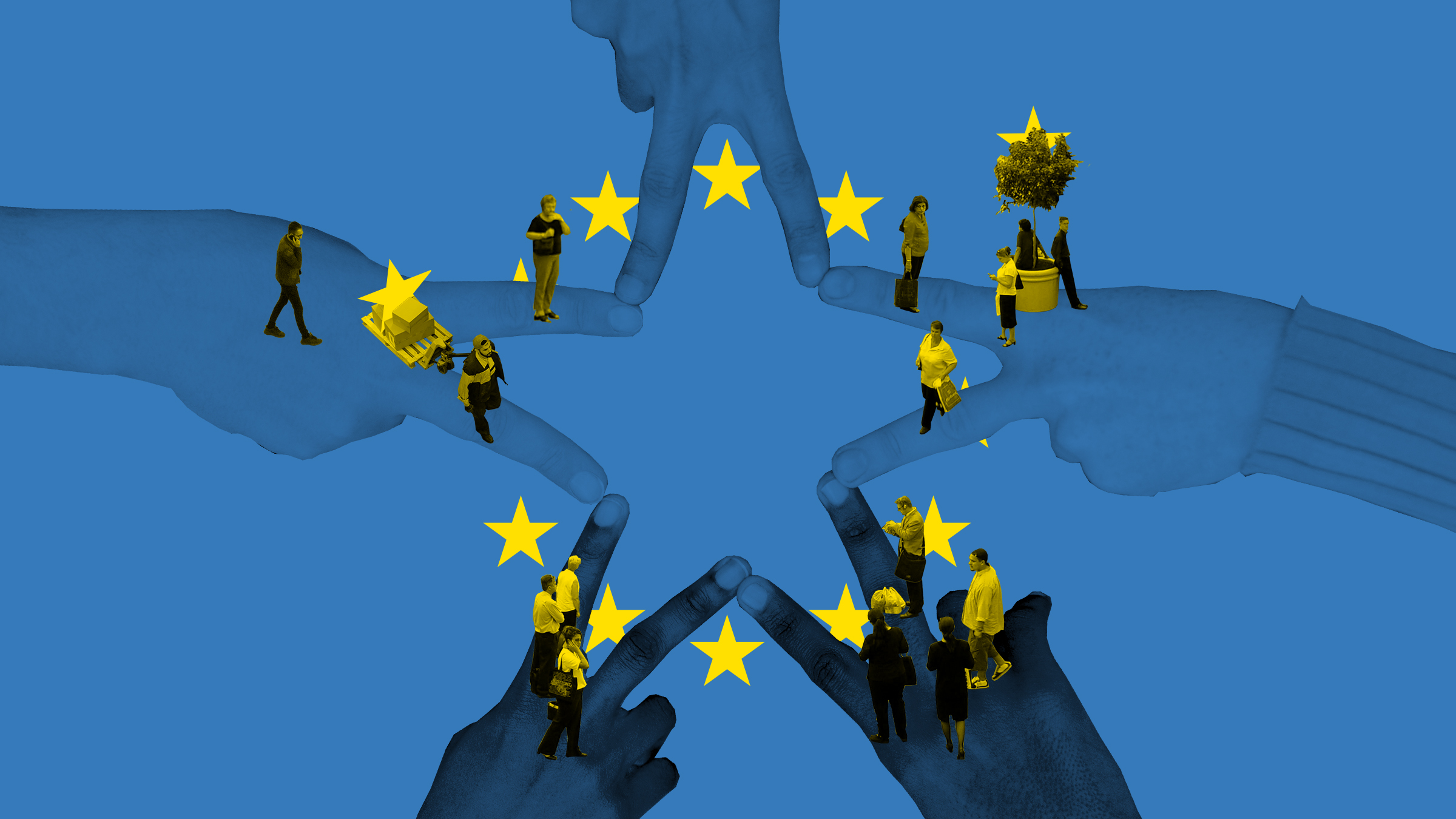The Conference on the Future of Europe, which ended on Europe Day, 9 May, was a joint project of the European Parliament, the Council and the Commission to listen to EU citizens and involve them in the debate on the future of Europe. The most optimistic contributions saw the conference as an opportunity to strengthen, deepen and revitalise democracy in the EU by supporting public involvement in the development of the EU. These expectations were not fully met, but the first conference – even with its shortcomings – can be considered as an ambitious and innovative attempt to highlight the role of EU citizens as a source of legitimate power for the European Union.
What was the conference all about?
One of the inspirations behind the conference was an article published by French President Emmanuel Macron in the run-up to the 2019 European elections, in which he invited EU citizens to shape and design Europe’s future. Ursula von der Leyen, the President of the European Commission, took up the proposal and a joint declaration on the conference was signed on 10 March 2021.
The main outcome of the conference was a final report, containing a compilation of the proposals generated by the citizens’ panels. The method and timetable for how the proposals will be followed up on have yet to be decided. The European Council, the European Parliament and the European Commission are committed to listening to and following up the proposals within their respective spheres of competence.
The conference consisted of three interconnected components. The first was a multilingual digital platform where over 50,000 users shared ideas, commented on and supported the ideas of others. The digital platform was particularly intended to provide input and contributions to the discussions held in the other stages of the conference.
The second component of the conference consisted of citizens’ panels held in the spirit of deliberative democracy. The debates were held in four thematic European Citizens’ Panels to which a total of 800 randomly selected, demographically representative EU citizens from 27 member states were invited.
The third component of the conference was a 450-member plenary session, mainly comprising citizens and representatives of EU institutions and national parliaments, which debated and adopted the proposals of the citizens’ panels. The plenary presented proposals to an executive board of three EU institutions before publishing the final report. National panels and events were organised alongside the joint European events, the ideas from which have been incorporated into the conference proposals.
The organisation of the conference was affected not only by the Covid-19 pandemic but also by differences in opinion between political parties, as well as national governments and EU institutions, on the mandate and governance of the conference. Although the conference was originally planned to last for two years, it was eventually condensed to a year, and its more detailed practical implementation was the subject of some wrangling during the process.
Originally, the conference was intended to have a role in influencing changes to EU treaties, but talk of such influencing has become more cautious and resulted in dispute soon after the publication of the final report. EU institutions and member states still have different views on the role and weight of the conference. Indeed, models of deliberative and participatory democracy are often perceived as challenging the old power and decision-making structures. The resulting resistance is a key challenge to their use.
What was the opinion of the conference regarding the development of European democracy?
The conference can be seen as an attempt by the EU to create a common European democratic structure, based on public deliberation, bringing together political decision-makers and citizens.
The scale of the conference was massive, including the proposals it produced. There were a total of 326 recommendations approved by the plenary, related to 49 objectives under nine themes. These took into account 178 proposals from the European citizens’ panels, national discussions and the over 16,000 ideas recorded on the Multilingual Digital Platform.
The final report’s proposals on democracy underscore the need for methods such as the conference.
The final report’s proposals on democracy emphasise the specific need for methods such as the conference. The proposals on participatory and deliberative democracy highlight the opportunities for citizens, especially young people, to participate at EU level between elections. The EU should develop the existing and new mechanisms for participation and provide better and more coherent information about them. These mechanisms should be inclusive and their impact should be monitored. Interaction between EU institutions and citizens should be enhanced through digital and other tools on both legislative issues and other EU matters. To enable participation and inclusion, EU institutions should use more accessible language, and the transparency of decision-making should be increased.
The proposals highlight the need for periodic citizens’ assemblies or panels. These should be organised sufficiently early in the decision-making process, with participants selected randomly, subject to representativeness criteria, and participation should be incentivised. If the institutions do not take the results of the meetings into account, this should be duly justified. The proposals emphasise the forms of participatory and deliberative democracy as having a role that complements and supports representative democracy. Among the more direct forms of direct democracy, the citizens’ panels of the conference proposed EU-wide referendums, which the European Parliament could launch on matters of particular importance to EU citizens.
The experience of the citizens’ panels, both at the conference and in different countries, have shown that citizens are often more prepared for major changes than decision-makers. For example, the citizens’ panels of the conference proposed replacing unanimity with qualified majority voting in EU decision-making, a European minimum wage, and voting for EU-wide electoral lists.
The experiences of the citizens’ panels, both at the conference and in different countries, have shown that citizens are often more prepared for major changes than decision-makers.
Studies have also shown the ability of citizens’ panels to support long-term decision-making and to seek sustainable solutions that transcend electoral terms and political silos. In climate policy, for example, research shows that decision-makers underestimate citizens’ capacity for change. The successful use of models of deliberative and participatory democracy can support rapid policy change and reform while maintaining legitimacy.
What should we learn from the conference?
The conference was an excellent learning experience for the EU and its democracy builders. There is a strong need for the development of deliberative and participatory democracy, as highlighted in the proposals of the conference. This is also an emerging international trend. The OECD has shown that investment in democratic innovations has increased significantly since the 2010s, and even talks of a wave of deliberative democracy. The EU also recently launched a Competence Centre on Participatory and Deliberative Democracy to develop the activities of its institutions. The challenges of the conference are unlikely to dissuade the EU from developing and using participatory methods – on the contrary.
Unfortunately, the conference received little media attention and was mainly visible to people working on the themes. The conference was massive, complex in structure and unclear in its objectives. It lacked a clear and well-communicated purpose and pre-determined procedures. The link between national and EU-level debates remained unclear.
In terms of deliberative democracy, the main challenge of the conference was the scope of the topics that the conference and the citizens’ panels were assigned to discuss, combined with time constraints. For example, the citizens’ panel on democracy also discussed European values, rights, the rule of law and security over three weekends. There was not enough time to digest the briefing material and expert presentations and to deepen the debate. Successful examples of deliberative democracy in Finland and abroad have highlighted the importance of a sufficiently well-defined topic, an easily understandable task and objective and sufficient time for discussion.
In contrast, the experience of the participants of the citizens’ panels was positive. More such experiences would be important for participation and the legitimacy of the EU. Studies have shown that deliberative discussions strengthen public trust and reduce polarisation, support civic competence and attachment to the political system, and increase the participants’ interest in and knowledge of political issues.
Positive experiences of participation contribute to active citizenship. Conversely, ignoring the results of participation tend to lead to dissatisfaction and distrust. The impact of the conference should therefore be ensured at the political decision-making level and demonstrated to the conference participants. If it were to have no impact, the conference would remain a large-scale administrative exercise.
If it were to have no impact, the conference would remain a large-scale administrative exercise.
The key question is whether the EU will be able to integrate forms of deliberative and participatory democracy into its decision-making and preparatory processes. For example, in Belgium and France (Paris), deliberative citizens’ assemblies have been permanently incorporated into decision-making at the local level. The public deliberations are seen as a valuable and reliable source of information for public debate and decision-making.
Incorporating deliberative models into decision-making is particularly challenging in the EU’s multidimensional processes, which are typified by conflicting interests between different EU institutions and member states. Whether they concern legislative initiatives, responding to major societal changes, EU strategic priorities or treaties, forms of civic participation should be linked to the process at a sufficiently early stage to have enough real opportunity to influence and set the agenda for debate. Diversifying the instruments of participation will enable people to find a natural and meaningful way to participate.
It is important that different interests and perspectives are well represented in deliberative citizens’ panels. Recruiting people with lower levels of education and in a weaker socio-economic positions to citizens’ panels has proven to be especially challenging. The panels held as part of the conference noted the poor representation of minorities. Diverse participation improves the quality of the results, strengthens the legitimacy of the process and makes the outcomes less likely to be subsequently challenged.
There have been good experiences from Finland and other countries of engaging decision-makers and citizens in joint deliberative discussions. Such a joint deliberation strengthens the political weight of the process and the willingness of the politicians involved to take the ideas and initiatives forward. Nevertheless, at the conference, the joint discussion only took place after the actual deliberation, and the venue was a plenary session in Strasbourg, the home arena of professional politicians who speak for a living. While this was a fine gesture, the timing, place and manner of the joint discussion could be reconsidered in order to foster balanced and open deliberation.
At this stage, it is difficult to assess the impact of the conference on EU policy or on addressing the democracy deficit in the EU. Nonetheless, the conference was an important opening for the development of deliberative and participatory democracy at EU level. It would be desirable for the conference to be a step towards a more systematic and regular use of these methods. The voice of citizens should be heard, not only at massive conferences on the future but also on a low-threshold basis on issues close to people’s daily lives.
But the key change should come at the level of political culture and decision-makers. Taking advantage of the methods of deliberative and participatory democracy requires courage, openness and trust in citizens on the part of decision-makers and those in preparatory processes. The EU has the potential to be a global leader in the development of more citizen-centred democracy. In the current situation, democracy and its development are the lifeblood of the EU.
Text: Onni Pekonen, Specialist, New forms of participation, Sitra
Originally published in Finnish 10 May 2022.

